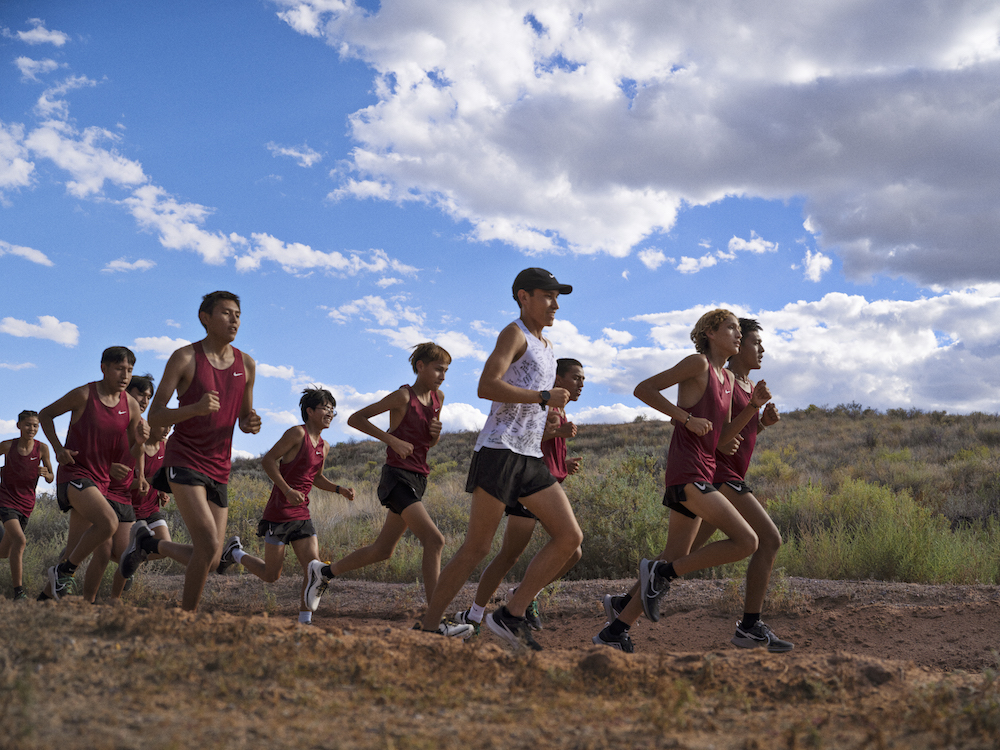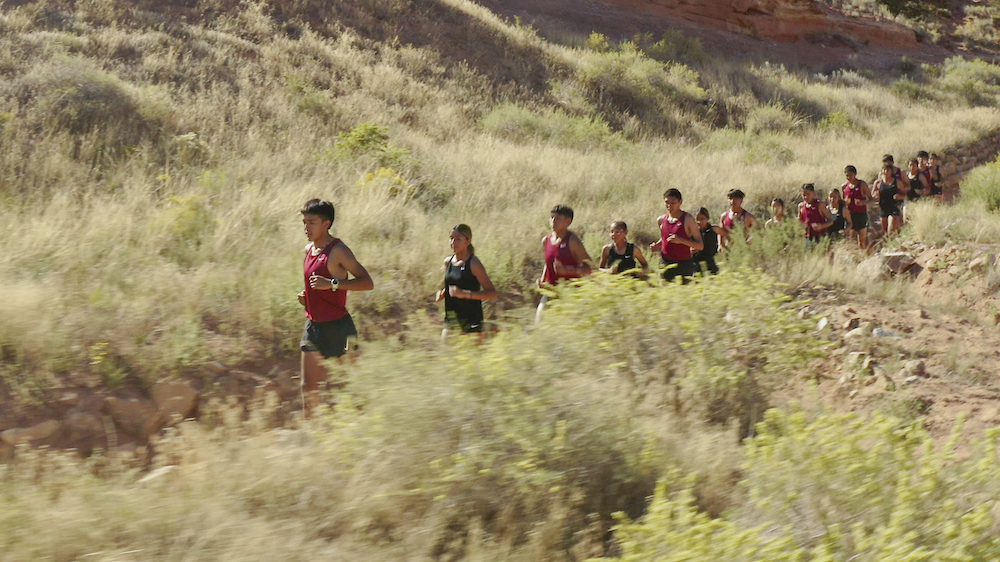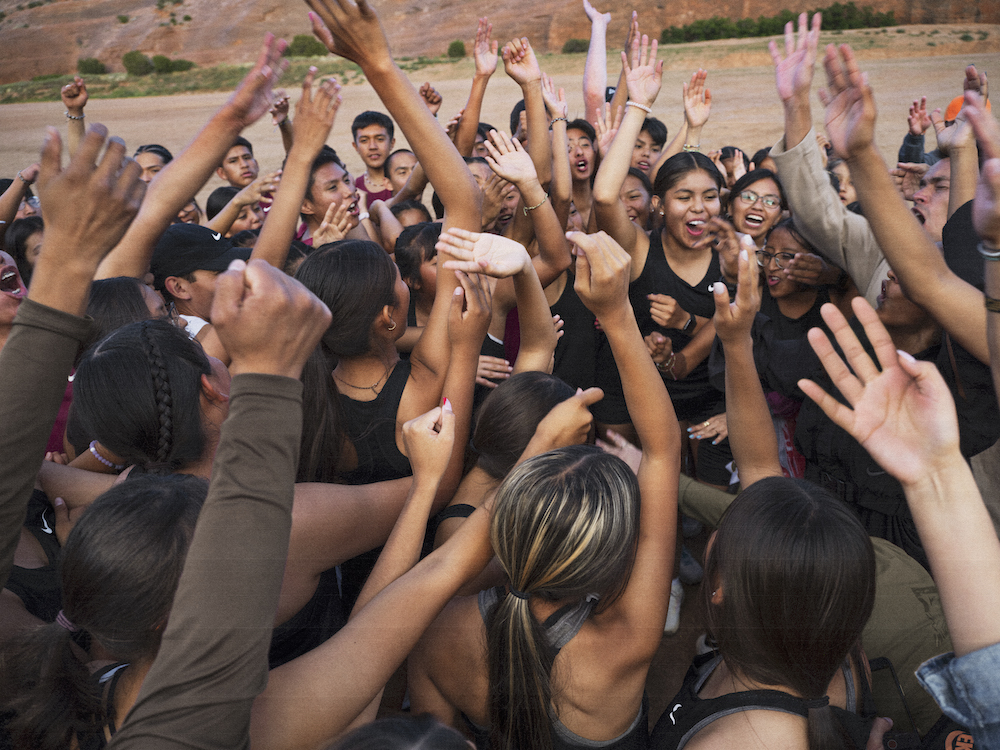
- Details
- By Native News Content Team
GALLUP, NM - Running is more than just a sport in the heart of Native American communities; it's a sacred tradition, a source of healing, and a testament to the enduring spirit of Indigenous people. For centuries, running has been woven into Native culture, serving as a connective thread that transcends physical fitness. It's about prayer, resilience, and building better communities.
Kyle Benally, the head coach of the Gallup High School Cross Country team, embodies that tradition. In February 2021, he assumed the coaching role of the Bengals' distance-running teams with a mission to rebuild a program steeped in pride and history. Benally himself is a product of Gallup's remarkable legacy, having once run under the guidance of Curtis Williams, a New Mexico Hall of Fame coach who claimed 25 team state titles and nurtured 18 individual state champions.
After high school, Kyle joined the Marines, later returning to his community, eager to rebuild an athletic program that had profoundly shaped him. Despite the program's historic success, recent years have seen them starting from scratch. Many of the student-athletes come from families living below the poverty line, where running shoes are a luxury, and often, they must train and race in the same pair.
 (Photo: Nike) In September, a glimmer of hope dawned for Gallup's young runners. Nike hosted an experience where they received Nike running and training gear, heard from Hosava Kretzmann, a Hopi/Navajo runner who was the top American finisher in the Los Angeles Marathon, and more. What made this gift even more special was the opportunity for the student-athletes to customize their Nike gear with phrases, patches, pins, and their names, representing their unique cultural identity.
(Photo: Nike) In September, a glimmer of hope dawned for Gallup's young runners. Nike hosted an experience where they received Nike running and training gear, heard from Hosava Kretzmann, a Hopi/Navajo runner who was the top American finisher in the Los Angeles Marathon, and more. What made this gift even more special was the opportunity for the student-athletes to customize their Nike gear with phrases, patches, pins, and their names, representing their unique cultural identity.
Nike has a long history of working with Native American and Indigenous communities. Nike’s N7 brand started in 2000 with the vision of Sam McCracken (Sioux and Assiniboine), who proposed selling Nike products directly to Native American tribes. His vision was to support health promotion and disease prevention programs, recognizing the transformative power of sports and physical activity. The N7 name is inspired by the Native American wisdom of the Seven Generations, emphasizing responsible decision-making that considers the impact of current choices on future generations.
Since 2009, the Nike N7 Fund has been a catalyst for change. It has awarded more than $8 million in grants that have benefited over 270 communities and organizations, making a substantial impact in the lives of Native American and Indigenous youth.
Nike's N7 brand is not just about sport; it's about empowerment, cultural recognition, and building stronger, healthier communities for generations to come. It’s part of a larger effort by Nike to bring to light stories of young athletes participating in the sport of running and to grow BIPOC representation in cross country.
 (Photo: Nike) Every year, 423,000 high school boys and girls across the nation compete in cross country. Yet, the sport of cross country often fails to accurately reflect the rich history of running. Historically, it has been presented and covered through a predominantly white filter, creating a perception of exclusivity. In truth, it is a sport with a diverse population of runners — including legendary Native American champions — who have been participating for generations.
(Photo: Nike) Every year, 423,000 high school boys and girls across the nation compete in cross country. Yet, the sport of cross country often fails to accurately reflect the rich history of running. Historically, it has been presented and covered through a predominantly white filter, creating a perception of exclusivity. In truth, it is a sport with a diverse population of runners — including legendary Native American champions — who have been participating for generations.
In Gallup, running isn't just about crossing the finish line; it's about connecting with a cultural legacy, transcending adversity, and reimagining victory. The resilience of the Gallup High School Cross Country team reflects the spirit of Indigenous communities across the country, where running isn't just a sport but a way of life.
EDITOR’S NOTE: Congratulations to the Gallup High School Bengals girl's and boy's cross country teams on winning the District 1-AAAA Championships on Saturday, Nov. 5 at Red Rock Park in Church Rock, New Mexico. The boy’s team finished first with an average time of 18:32 and 37 points, led by the overall first-place finisher, Theodore Roundface. The team placed four runners in the top 10. The girl’s team won with an average time of 22:52 and 44 points, led by Mykeia Vicenti-Wolf and Madison Martinez, who finished second- and third-place, respectively.
Help us defend tribal sovereignty.
At Native News Online, our mission is rooted in telling the stories that strengthen sovereignty and uplift Indigenous voices — not just at year’s end, but every single day.
Because of your generosity last year, we were able to keep our reporters on the ground in tribal communities, at national gatherings and in the halls of Congress — covering the issues that matter most to Indian Country: sovereignty, culture, education, health and economic opportunity.
That support sustained us through a tough year in 2025. Now, as we look to the year ahead, we need your help right now to ensure warrior journalism remains strong — reporting that defends tribal sovereignty, amplifies Native truth, and holds power accountable.
 The stakes couldn't be higher. Your support keeps Native voices heard, Native stories told and Native sovereignty defended.
The stakes couldn't be higher. Your support keeps Native voices heard, Native stories told and Native sovereignty defended.
Stand with Warrior Journalism today.
Levi Rickert (Potawatomi), Editor & Publisher
